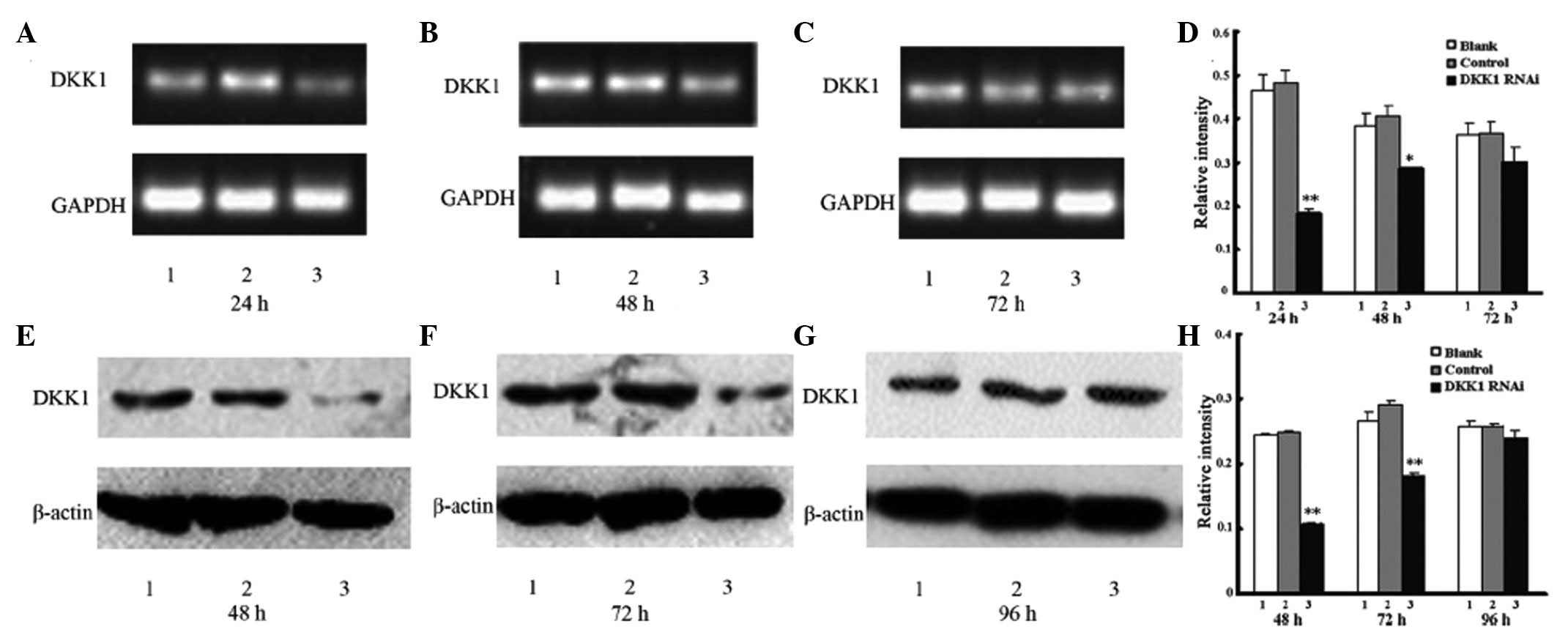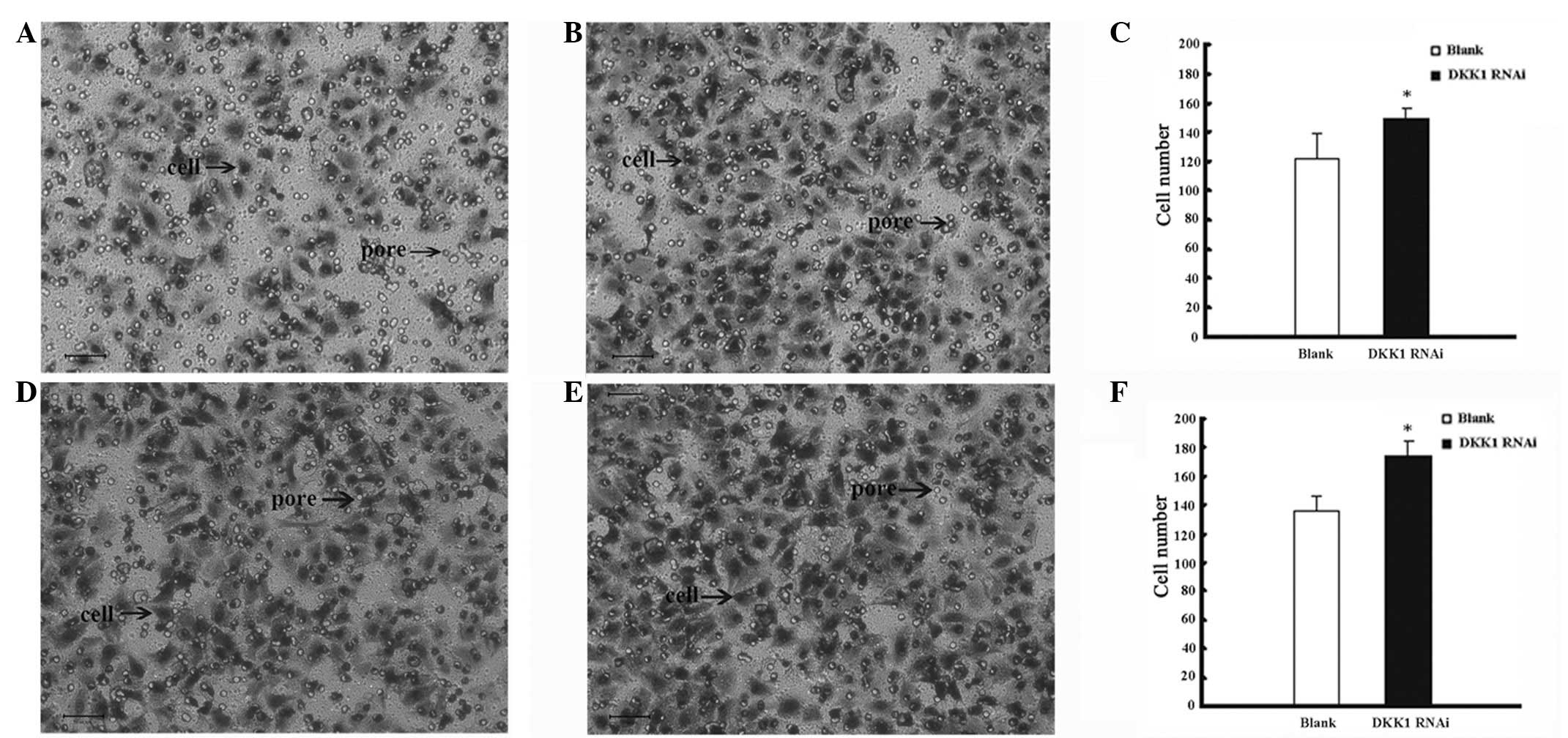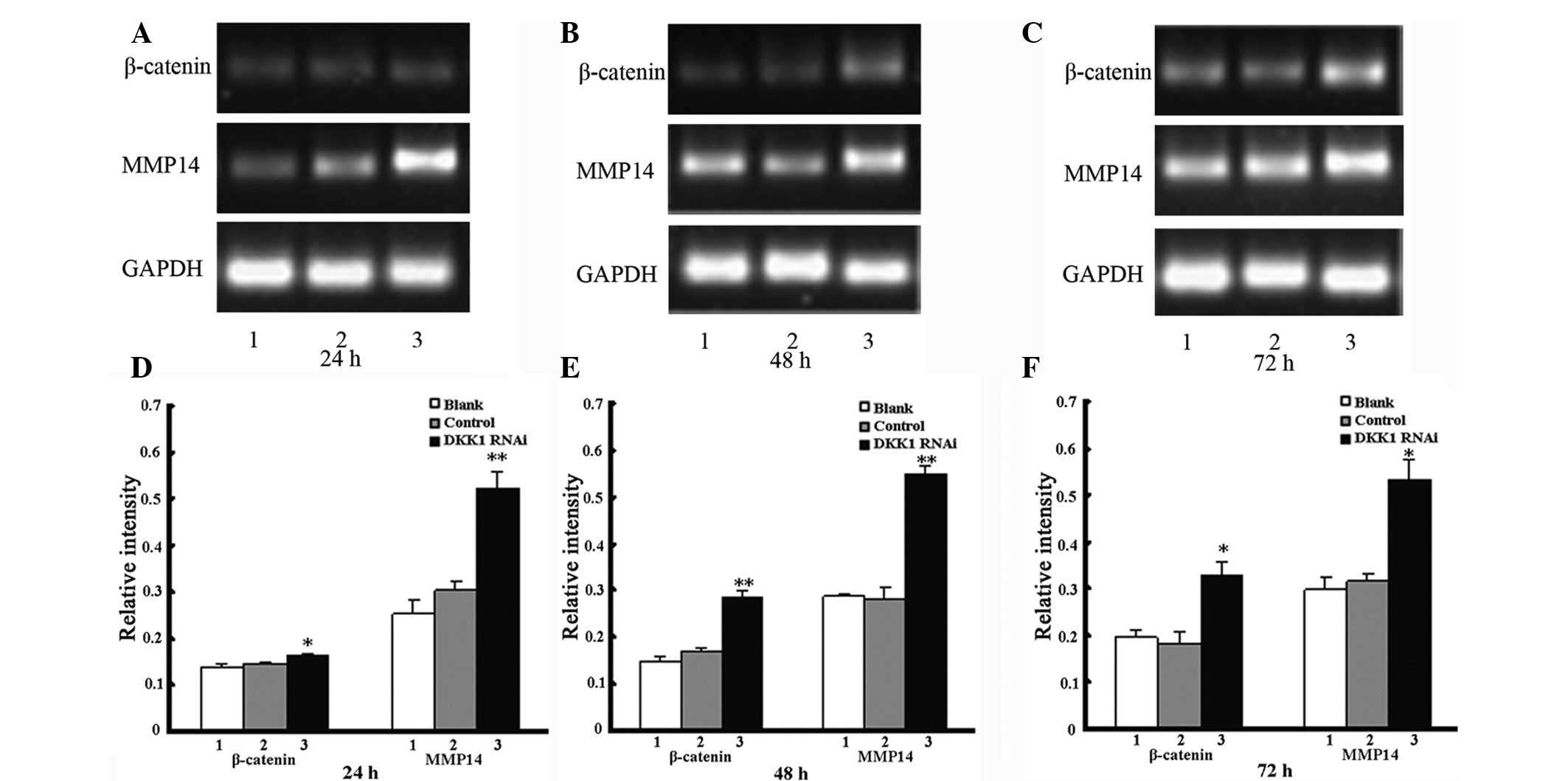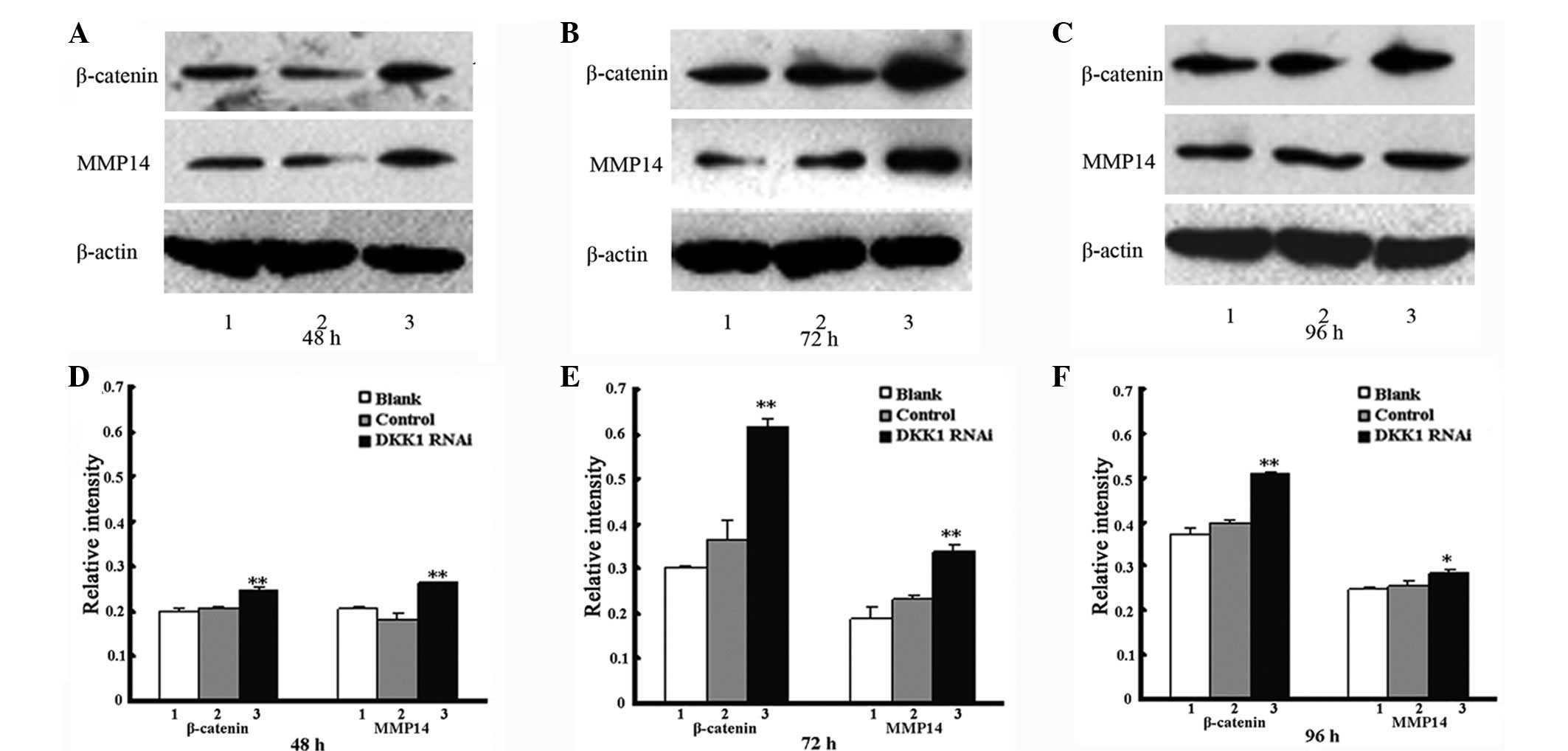|
1
|
Akhmedkhanov A, Zeleniuch-Jacquotte A and
Toniolo P: Role of exogenous and endogenous hormones in endometrial
cancer: review of the evidence and research perspectives. Ann NY
Acad Sci. 943:296–315. 2001. View Article : Google Scholar : PubMed/NCBI
|
|
2
|
Arai Y, Kubota T, Nakagawa T, et al:
Production of urokinase-type plasminogen activator (u-PA) and
plasminogen activator inhibitor-1 (PAI-1) in human brain tumours.
Acta Neurochir (Wien). 140:377–386. 1998. View Article : Google Scholar : PubMed/NCBI
|
|
3
|
Bogenrieder T and Herlyn M: Axis of evil:
molecular mechanisms of cancer metastasis. Oncogene. 22:6524–6536.
2003. View Article : Google Scholar
|
|
4
|
Terstappen GC, Gaviraghi G and Caricasole
A: The Wnt signaling pathway as a target for the treatment of
neurodegenerative disorders. IDrugs. 9:35–38. 2006.PubMed/NCBI
|
|
5
|
Bienz M and Clevers H: Linking colorectal
cancer to Wnt signaling. Cell. 103:311–320. 2000. View Article : Google Scholar : PubMed/NCBI
|
|
6
|
Collavin L and Kirschner MW: The secreted
Frizz1ed-related protein Sizzled functions as a negative feedback
regulator of extreme ventral mesoderm. Development. 130:805–816.
2003. View Article : Google Scholar : PubMed/NCBI
|
|
7
|
Mao B, Wu W, Li Y, et al:
LDL-receptor-related protein 6 is a receptor for Dickkopf proteins.
Nature. 411:321–325. 2001. View
Article : Google Scholar : PubMed/NCBI
|
|
8
|
Aravind L and Koonin EV: A colipase fold
in the carboxy-terminal domain of the Wnt antagonists - the
Dickkopfs. Curr Biol. 8:R477–R478. 1998. View Article : Google Scholar : PubMed/NCBI
|
|
9
|
Müller A, Homey H, Soto H, et al:
Involvement of chemokine receptors in breast cancer metastasis.
Nature. 410:50–56. 2001.PubMed/NCBI
|
|
10
|
Staun RE, Goldman S, Gabarin D, et al:
Expression and importance of matrix metalloproteinase 2 and 9
(MMP-2 and −9) in human trophoblast invasion. Reprod Biol
Endocrinol. 2:592004.
|
|
11
|
Staff AC, Ranheim T, Henriksen T, et al:
8-Iso-prostaglandin f(2alpha) reduces trophoblast invasion and
matrix metalloproteinase activity. Hypertension. 35:1307–1313.
2000. View Article : Google Scholar : PubMed/NCBI
|
|
12
|
Fedi P, Bafico A, Nieto SA, et al:
Isolation and biochemical characterization of the human Dkk-1
homologue, a novel inhibitor of mammalian Wnt signaling. J Biol
Chem. 274:19465–19472. 1999. View Article : Google Scholar : PubMed/NCBI
|
|
13
|
Bafico A, Liu G, Goldin L, Harris V and
Aaronson SA: An autocrine mechanism for constitutive Wnt pathway
activation in human cancer cells. Cancer Cell. 6:497–506. 2004.
View Article : Google Scholar : PubMed/NCBI
|
|
14
|
Maehata T, Taniguchi H, Yamamoto H, et al:
Transcriptional silencing of Dickkopf gene family by CpG island
hypermethylation in human gastrointestinal cancer. World J
Gastroenterol. 14:2702–2714. 2008. View Article : Google Scholar : PubMed/NCBI
|
|
15
|
Koppen A, Ait-Aissa R, Hopman S, et al:
Dickkopf-1 is down-regulated by MYCN and inhibits neuroblastoma
cell proliferation. Cancer Lett. 256:218–228. 2007. View Article : Google Scholar : PubMed/NCBI
|
|
16
|
Pollheimer J, Loregger T, Sonderegger S,
et al: Activation of the canonical wingless/T-cell factor signaling
pathway promotes invasive differentiation of human trophoblast. Am
J Pathol. 168:1134–1147. 2006. View Article : Google Scholar : PubMed/NCBI
|
|
17
|
Grisaru-Granovsky S, Maoz M, Barzilay O,
et al: Protease activated receptor-1, PAR1, promotes placenta
trophoblast invasion and beta-catenin stabilization. J Cell
Physiol. 218:512–521. 2009. View Article : Google Scholar : PubMed/NCBI
|
|
18
|
Mao J, Wang J, Liu B, et al: Low-density
lipoprotein receptor-related protein-5 binds to Axin and regulates
the canonical Wnt signaling pathway. Mol Cell. 7:801–809. 2001.
View Article : Google Scholar : PubMed/NCBI
|
|
19
|
Giles RH, van Es JH and Clevers H: Caught
up in a Wnt storm: Wnt signaling in cancer. Biochim Biophys Acta.
1653:1–24. 2003.PubMed/NCBI
|
|
20
|
Crawford HC, Fingleton BM, Rudolph-Owen
LA, et al: The metalloproteinase matrilysin is a target of
beta-catenin transactivation in intestinal tumors. Oncogene.
18:2883–2891. 1999. View Article : Google Scholar : PubMed/NCBI
|
|
21
|
Tetsu O and McCormick F: Beta-catenin
regulates expression of cyclin D1 in colon carcinoma cells. Nature.
398:422–426. 1999. View
Article : Google Scholar : PubMed/NCBI
|
|
22
|
Polakis P: Wnt signaling and cancer. Genes
Dev. 14:1837–1851. 2000.
|
|
23
|
Bafico A, Liu G, Yaniv A, Gazit A and
Aaronson SA: Novel mechanism of Wnt signalling inhibition mediated
by Dickkopf-1 interaction with LRP6/Arrow. Nat Cell Biol.
3:683–686. 2001. View
Article : Google Scholar : PubMed/NCBI
|
|
24
|
Ichikawa Y, Ishikawa T, Tanaka K, Togo S
and Shimada H: Extracellular matrix degradation enzymes: important
factors in liver metastasis of colorectal cancer and good targets
for anticancer metastatic therapy. Nihon Geka Gakkai Zasshi.
102:376–380. 2001.(In Japanese).
|
|
25
|
González-Sancho JM, Aguilera O, García JM,
et al: The Wnt antagonist DICKKOPF-1 gene is a downstream target of
beta-catenin/TCF and is downregulated in human colon cancer.
Oncogene. 24:1098–1103. 2005.PubMed/NCBI
|
|
26
|
Mao B and Niehrs C: Kremen2 modulates
Dickkopf2 activity during Wnt/LRP6 signaling. Gene. 302:179–183.
2003. View Article : Google Scholar
|
|
27
|
Logan CY and Nusse R: The Wnt signaling
pathway in development and disease. Annu Rev Cell Dev Biol.
20:781–810. 2004. View Article : Google Scholar : PubMed/NCBI
|
|
28
|
Holen T, Amarzguioui M, Babaie E and Prydz
H: Similar behaviour of single-strand and double-strand siRNAs
suggests they act through a common RNAi pathway. Nucleic Acids Res.
31:2401–2407. 2003. View Article : Google Scholar : PubMed/NCBI
|
|
29
|
Yi N, Liao QP, Li T and Xiong Y: Novel
expression profiles and invasiveness-related biology function of
DKK1 in endometrial carcinoma. Oncol Rep. 21:1421–1427.
2009.PubMed/NCBI
|
|
30
|
Yi N, Liao QP and Li T: Expression and
influence of Dickkopf1 on invasion ability in endometrial
carcinoma. Xian Dai Fu Chan Ke Jin Zhan Bian Ji Bu. 2:113–116.
2009.
|
|
31
|
Yi N, Liao QP, Xue XO and Liu M:
Expression of Dickkopf-1 in endometrial carcinoma and normal
endometrial tissues and its clinicopathological significance. Zhong
Guo Quan Ke Yi Xue Bian Ji Bu. 9:981–983. 2011.
|


















